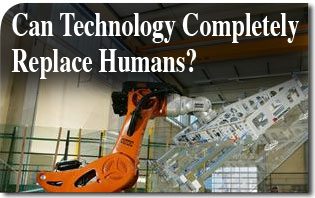 With computers, robots and other digital technologies acquiring basic tasks and even more advanced skills at an extraordinary rate, what is the future of the labor market? For more than a century, automation has increasingly replaced a portion of the labor market as technology advances with robotic automation performing more and more blue-collar jobs. The latest trend is for information technologies to replace white-collar jobs.
With computers, robots and other digital technologies acquiring basic tasks and even more advanced skills at an extraordinary rate, what is the future of the labor market? For more than a century, automation has increasingly replaced a portion of the labor market as technology advances with robotic automation performing more and more blue-collar jobs. The latest trend is for information technologies to replace white-collar jobs.
It seems that Akio Toyoda, president of Toyota, is looking to reintegrate people into the manufacturing process where robotic production has failed. He has called upon Mitsuru Kawai, a 50-plus-year veteran in Toyota’s manufacturing to promote what the most technologically advanced robotic automation cannot produce—craftsmanship. While this might appear counter-intuitive to those who rely excessively on technology for production, Toyoda has found that “smart factories” are, well, pretty dumb.
The lower echelon of the labor force has been reduced to simply feeding parts into machines and addressing mechanical malfunctions. While many see this as the optimum union of man and machine that achieves peak production, there appears to be a sizable downside in the final product—quality.
For the much touted prowess of computers and robots outperforming their human counterparts in the categories of speed and precision, they have absolutely no understanding, perspective or judgment in matters of quality or personalization.
Furthermore, many companies such as Toyota are realizing a substantial decay in know-how, as employees have not had sufficient exposure to the development and manufacturing of products now done by automated technology. If an employee understood how to make parts from scratch, ideas for automation would be perfected without replacing the personal and qualitative elements of a product.
However, the debate over automation’s role is not about job creation or loss of jobs as a consequence of technology. It is about the substitution of the irreplaceable human element.
Unfortunately, too much emphasis has been placed on what computers and robots can do that is easily measurable, and too little emphasis on what people can do that is not easily measurable. The profit for using automation is short term because of speed and accuracy, while the loss is long term through the lack of craftsmanship, personalization and quality.
The personal mastery of a profession is lost when automation dominates an industry and even though a factory might be able to churn out billions of widgets per day for pennies, the net result is an inferior standardized product that lacks individual appeal. Sure, there are hundreds of brands of computers on the market, as long as you buy a Mac or a PC. Henry Ford stated, “any customer can have a car painted any color that he wants so long as it is black.”
A simple definition of technology is the application of scientific knowledge for practical purposes. It is a means not an end, with the goal of serving man. What Toyoda is beginning to realize is that man must dominate technology, not vice versa.
Technology cannot replace the human element. No robot will ever possess common sense, the human touch, the ability of persuasion, a notion of quality, the ability to teach, or the ability to make a nuanced decision. In short, what Toyota has discovered in their pursuit of perfection is that technology cannot replace human ingenuity. In certain applications, technology has in fact reached a limit and must be relegated to be used as the resource that it is: a service to man not a replacement.
